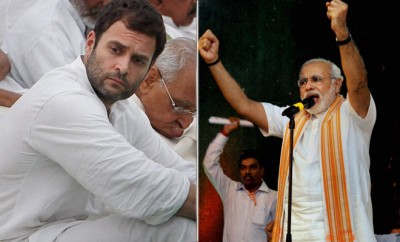LSE Professor Sumantra Bose predicts that the role of the Nehru-Gandhi family in the Congress Party will shrink after the 2014 general elections in India and that BJP’s prime ministerial candidate Narendra Modi will prove a damp squib. A version of this article first appeared in The Economic Times.
The dwindling role of the “family” in the Grand Old Party is one “certainty” of the next general election, says Sumantra Bose, whose recent book, Transforming India, chronicles the evolution of Indian democracy since the 1950s. “The [Congress] party, having hitched its wagon to the ‘dynasty’, is in grave danger of suffering terminal damage as the dynasty fades away,” he says, emphasising that the Congress’s “guarantee for survival and relevance” would have been to re-invent itself as a federal, nationwide party with autonomous state units led by “serious” leaders, and mechanisms for collective decision-making by those leaders at the national level.
“It’s probably too late for that now,” he opines, adding that the tragedy of the Congress is that instead of adapting to changed political circumstances, it chose to blindly follow the dynasty’s delusional hankering for the pre-1989 political era. Bose argues in his book that 1989, which witnessed a resounding poll rout for the Congress, was a crucial year for Indian democracy.
The UK-based scholar also says he sees glimpses of the late social activist and political leader Rammanohar Lohia in BJP prime ministerial candidate Narendra Modi, who, he notes, uses a political “vernacular” similar to Lohia’s. Such utterances, he believes, may be out of place in cocktail parties but go down well with more earthy audiences.
But then Bose – who has written extensively about Sri Lanka, Kashmir, Bosnia and the Maoist challenge besides others – doesn’t anticipate a Modi wave in the next general election. He predicts that Modi will turn out to be a damp squib for several reasons. “First: his personal limitations as a politician. He is too controversial, divisive and shrill, in sharp contrast to (Atal Bihari) Vajpayee. Second: the territorial limitations of his party’s base. The BJP is weak and marginal in nearly all the states of southern and eastern India, and in key northern states it faces strong challengers in regional parties.”
Bose goes on to add that “in Uttar Pradesh, the BJP will have to more than double the 15 per cent vote share it got in the 2012 state election in order to reap a windfall of 50-plus Lok Sabha seats. I don’t see this happening. In Bihar, it has prospects but will have to compete with two significant regional parties, RJD and JD-U.”
The LSE scholar is of the view that Modi’s support base suffers from “huge social limitations”. He explains that “[Modi’s] enthusiasts are concentrated among the relatively affluent sections of urban society (and among India’s corporate elite), in a predominantly rural nation where the poor and not the Twitterati comprise the majority.”
Bose also feels that the regionalised political landscape of India is a Himalaya-like barrier to Modi’s ambitions. According to him, it is worth mentioning that the only new pre-poll regional ally the BJP is likely to pick up is the TDP, which is in a “back-to-the-wall” situation in Andhra Pradesh due to Telangana Rashtriya Samiti’s dominance in Telangana and YSR Congress’s meteoric rise in Seemandhra.
As regards the Aam Admi Party (AAP), Bose says he sees the new party’s near-term future as a de facto regional party of Delhi and adjoining semi-urban areas of Uttar Pradesh and Haryana. “I don’t think it will be able to replicate its breakthrough in Delhi in any of the other five biggest cities, so in that sense it’s not even a nationwide urban phenomenon,” says Bose. He finds the AAP’s convenor Arvind Kejriwal to be a savvy political entrepreneur who got both his strategy and his tactics right in Delhi. “The extreme disappointment among the public with the Congress Party and its government at the centre provided the opening for this fledgling ‘insurgent’ party to get nearly a third of the vote in Delhi, the vast bulk of it from erstwhile Congress voters and from new voters.” This “Delhi model” is, however, not easily, if at all, replicable in other cities and states, each of which has its own specific context and dynamics, Bose declares.
But Bose believes AAP’s success is a wake-up call for mainstream parties. “Mainstream political parties and leaders should realise that if public rage crosses a certain threshold, even maverick outfits like the AAP can steal a march on them,” says Bose, adding that he is now convinced that people will not tolerate incompetence, corruption and arrogance beyond a point, and that the established ways of doing politics are not invincible.
Sumantra Bose is Professor of International and Comparative Politics in LSE’s Department of Government.








